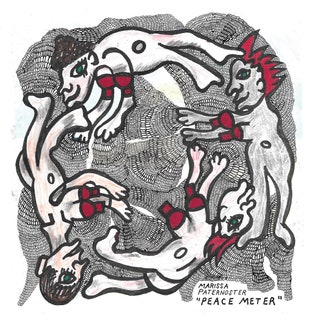On her debut solo album under her own name, the Screaming Females frontperson reintroduces herself, placing the focus on her remarkable singing voice.
Over the past 15 years, Marissa Paternoster has made a name for herself as the driving force behind New Jersey rock band Screaming Females and, occasionally, under the solo moniker Noun. The 35-year-old musician is as nimble as she is reckless when wielding her faithful G&L guitar, and her playing has ranged from heralded classic-rock riffs to the type of punk-indebted shredding that elicits blisters. This unbridled talent, however, isn’t the focus of Peace Meter. On her debut solo album under her own name, Paternoster bolsters the other core instrument that’s often left in the shadows: her voice.
When faced with a canceled tour at the start of the pandemic, Paternoster holed up in her grandmother’s house by herself and sent the skeleton of a song to Thou guitarist Andy Gibbs in hopes of fleshing out new ideas. That digital swap morphed into a regular long-distance collaboration and, over the span of several months, included two other musicians: Snakeskin’s Shanna Polley on backup vocals and Lung’s Kate Wakefield on cello. For much of her career, Paternoster’s trademark has been a guttural trill that verges on a warning sign, like a rattlesnake’s hiss before pouncing on its prey, that fits in whiplash punk songs and jittery pop-punk tracks alike. On Peace Meter, however, she softens her voice and the force at which she sings. Long vibratos billow and puff up, and the more she elongates them, the softer they become.
Album opener “White Dove” introduces this evolution in a little over four minutes. While a steady kick drum pounds in the distance, Paternoster sings about a white dove’s feathers soaking in blood and lets the vowels wobble as they leave her mouth. With each repetition of the refrain, she rounds out the edges of her vibrato until it becomes a soothing, meditative loop. Elsewhere, she uses minimalist 1980s synth pop as the groundwork for wistful vocal harmonies about a fractured relationship (“I Lost You”) and draws out her choir-like melody with riffs that descend like molasses (“Sore”). While there are flashes of her usual rock-adjacent songwriting, like on the snappy indie-rock single “Black Hole,” Paternoster often opts to replace her guitar solos with mellow vocal coos.
If Peace Meter at large serves as a reintroduction, then “Balance Beam” plays like Paternoster’s breathtaking entry into the gala ballroom. Subdued and elegant, the stripped-down ballad layers fingerpicked acoustic guitar with haunting cello and delicate vocal harmonies. Her vocal delivery recalls Grouper, and her pitch is lush and soft while bright enough to cut through the foggy drone. The song positions her voice as a meditative instrument, more suited for echoing through posh theaters than riling up fans in sweat-drenched venues. It’s the surprising pillar of a collection defined by its beautiful vocal performances and relaxed pace. The emotional effect rings just as loud as her heavier work, and it proves that Paternoster is far more than her six strings.



0 comments:
Post a Comment